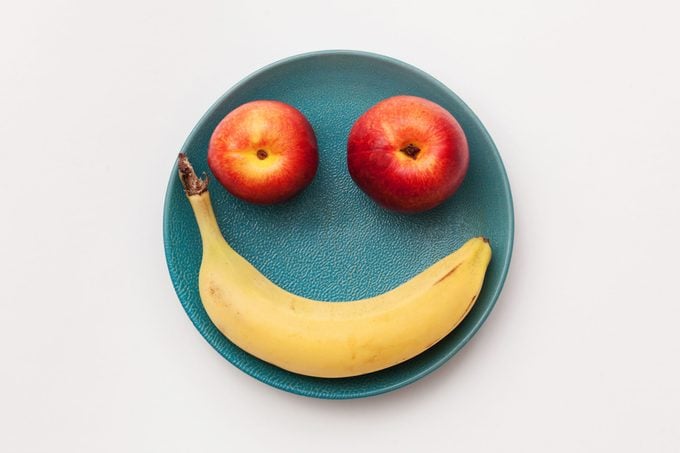Managing Blood Pressure? Eating These 2 Fruits Might Lower Mortality Risk, New Study Says
Updated: Mar. 29, 2024

These two fruity favorites are known for specific benefits. Now doctors point to another win that's good for the heart, and possibly a longer life.
One is known for its heart-healthy potassium, and the other is said to keep the doctor away overall. Now doctors from three universities in China have found that apples and bananas may add years to the lives of patients diagnosed with hypertension.
A study published in the March 2024 peer-reviewed Frontiers in Nutrition journal aimed to assess how fruit consumption affected the lifespans of individuals with high blood pressure. The research team analyzed data collected between 2003 and 2006 from the U.S.-based National Health and Nutrition Examination Survey (NHANES), selecting medical metrics gathered on individuals who’d been diagnosed with hypertension. The researchers identified 2,480 patients with the condition who also completed a survey about their typical eating habits. Further data collected 10 years later revealed that 658 of the participants had subsequently passed away.
Based upon their analysis, the researchers discovered that on average, the subjects who ate apples or bananas three to six times per week lived longer. And while eating one of these fruits several times a week correlated with a longer life, those who incorporated both fruits fared even better. “Individuals who consume apples or bananas three to six times per week have a reduced risk of all-cause mortality by 40%,” concluded the researchers, even after adjusting for certain variables like sex, age, race, education level, and various health conditions like cardiovascular disease and diabetes.
Interestingly, people who ate pears, grapes, and pineapples did not appear to experience the same benefits.

The researchers theorize that the fiber in both fruits might play a role in their protective benefits, as fiber has been shown to help manage high blood pressure. However, this doesn’t explain why pears wouldn’t work, since they are also high in fiber.
The skin of the apple and its unique polyphenol makeup could be reasons, the researchers added.
As for bananas, they contain several vitamins, minerals, and protective compounds along with a good dose of fiber. Plus, bananas are high in potassium, which has been shown to lower blood pressure. (Bananas have also been shown to benefit gut health, which research has found yields systemic physiological effects.)
Since relatively few fruits were examined in this study, the researchers suggest not dismissing others for a heart-healthy diet. “It is important to note that the conclusions of this study are specific to a particular population and cohort,” they said. “Therefore, they should not be used to dismiss the health benefits of other fruits.”
If You Don’t Eat a Banana Every Day, This Might Convince You to Start
The doctors added that this doesn’t present a green light for endless fruit consumption, noting that “increasing consumption beyond this range (three to six per week) did not provide additional advantages.” Even though fruit provides natural sugars, it still affects blood glucose and other health measurables.
The bottom line many health and nutrition professionals would advise is to eat a diverse diet that’s rich in colorful plants. For hypertension, produce items like avocados, strawberries and tomatoes have also been associated with lower blood pressures.

















